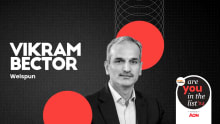Leaders have to make their own choices

You worked in the defence forces before joining the corporate world. What did you learn during that period, which has stayed with you even today?
The one thing that comes across as a strong feature while working in the defence forces is the hierarchy. As a senior, one always needs to keep the soldiers inspired. So, inspirational leadership works the best in the defence forces and I believe this also applies to the corporate scenario. The second thing is reducing all kinds of uncertainties and showing clear directions to your team. As a leader, one has to look forward, plan ahead in terms of capabilities and how can they be manoeuvred in the best possible way. Another key learning is to look at the bigger picture with a tactical and strategic mindset, while balancing out the physical and mental health as they say ‘healthy mind in a healthy body’.
How difficult or challenging was your transition from the armed forces to the corporate world? Also, please take us through your approach for transforming businesses.
The armed forces train you to adapt to any situation as one changes jobs every two to three years. A good leader shows a clear strategy and vision to his people. Leaders need to think beyond their constraints and look at things in a broader perspective, considering the situations the others are in as well. It is easy to be judgemental, but it is important to put yourself in others’ shoes and understand what they are thinking. It is important to introspect, discuss and then implement processes and all this requires a lot of clarity in thinking on the part of the leaders. Technology has made it possible for anyone to access abundant information at ease, but this also brings a lot of complexity. As a consequence, we lose out by not focusing on the bigger picture and instead get dragged into the complexity. A good leader brings in simplicity while dealing with issues.
What are the techniques that help leaders bring back the simplicity?
I can say that it is very important to ask that one question and sit back, look at the big picture and identify a solution. Coaching helps a lot, whether is it about making difficult decisions or choosing the right track. As a leader, you are paid to take decisions without knowing whether you are right or wrong. Nobody can tell you if you’re right or wrong; people can advise you, but leaders have to make their own choices.
Is there a cultural element on how leaders confront a situation of change?
In the corporate world, there is a corporate culture as well as a national culture. We should focus more on the corporate culture than the country culture. Secondly, having worked in a lot of countries, I believe people are people and it’s mainly the personality and the beliefs that make things happen. The culture in India is a part of the performing corporate world and one which deploys execution and hierarchy in a way that you are expected to come up with your problems and ask for solutions and then you are told what to do. This seems very comfortable to most leaders in some sense.
What is the one thing that comes in the way to business transformation?
The biggest obstacle is the resistance to change. It’s about working with people and changing the mindsets in order to move forward.
Henry de Montjoye has been with Mercuri Urval since 1988 and has been in charge of developing the company’s executive strategy in France in coordination with the group. He was also responsible for taking on the leadership of certain international projects related to business transformation, identifying talented individuals and/or recruiting programmes. Since the end of 2007, he has been heading the company’s India operations.











